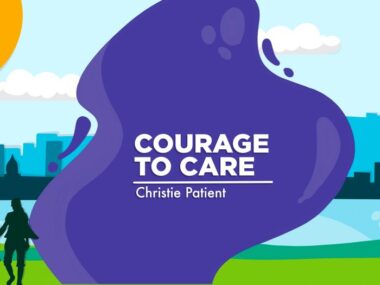Recognizing and managing depression in life with a rare disease
If you're struggling with mental health, there are resources available to help
Written by |

“You’ll Never Walk Alone” was written by Richard Rodgers and Oscar Hammerstein II for the 1945 musical “Carousel.” Many others have performed the song over the years, and it’s even become the anthem for Liverpool Football Club in England. Most recently, I’ve enjoyed the version by Marcus Mumford. Take a minute to read some of the lyrics he used:
“When you walk through a storm/ Hold your head up high/ And don’t be afraid of the dark/ … Walk on, walk on/ With hope in your heart/ And you’ll never walk alone.”
When I was diagnosed with idiopathic pulmonary fibrosis (IPF) in January 2017, I quickly learned it was a rare, chronic, progressive disease with no cure. As you might imagine, that prognosis can be depressing.
Patients and caregivers may feel overwhelmed by the volume of appointments, medications, and the reality of the disease. Recognizing the signs of depression can be helpful for any rare disease community.
According to the Anxiety and Depression Association of America, symptoms of depression may include:
- “Persistent sad, anxious or ’empty’ mood”
- “Feelings of hopelessness, pessimism”
- “Feelings of guilt, worthlessness, helplessness”
- “Loss of interest or pleasure in hobbies and activities, including sex”
- “Decreased energy, fatigue, feeling ‘slowed down'”
- “Difficulty concentrating, remembering, making decisions”
- “Insomnia, early-morning awakening, or oversleeping”
- “Low appetite and weight loss or overeating and weight gain”
- “Thoughts of death or suicide, suicide attempts”
- “Restlessness, irritability”
- “Persistent physical symptoms that do not respond to treatment, such as headaches, digestive disorders and pain for which no other cause can be diagnosed.”
It’s important for me to share an inclusive list of possible signs. Some of the lesser-known symptoms may be overlooked by the person experiencing depression and by the casual observer. Were there any on the list that surprised you?
Another form of depression, which I’ve often seen in the IPF community following a lung transplant, is referred to as survivor’s guilt. When I received my bilateral lung transplant in July 2021, I immediately realized that receiving the lungs that saved my life meant another person had died.
I’d sought out information on transplant and organ donation before I was ever listed, so I’d already come to terms with this reality. I understood that the decision to donate one’s organs was a selfless gift.
In my Feb. 14, 2023, column, I interviewed two donor families. Both were glad their loved one’s passing had provided the gift of life to someone. It created a legacy that lives on.
Managing mental health issues
Dealing with depression associated with a rare disease diagnosis or survivor’s guilt can be overwhelming. Big feelings don’t just go away. Knowing the signs can help you and your loved ones recognize when you might need help.
May is Mental Health Awareness Month, an opportunity to raise awareness of the challenges associated with mental health issues and combat harmful stigmas.
If you’re struggling, help is available to you. If you visit a facility that’s part of the Pulmonary Fibrosis Foundation (PFF) Care Center Network, a social worker will be assigned to help you find the proper resources.
Support groups are a great way to find others on a similar rare disease journey, but keep in mind that the groups aren’t one-size-fits-all. You might have to try several to find one where you feel comfortable and that best meets your needs. The PFF provides a support group locator where you can search for in-person and virtual support groups.
So what does all that have to do with a song from a 1945 musical? If the pulmonary fibrosis community had an anthem, it could be “You’ll Never Walk Alone.” I’m always amazed at how willing members of this community are to share their experiences. Doing so has been therapeutic for me. It’s how I make every breath count.
Note: Pulmonary Fibrosis News is strictly a news and information website about the disease. It does not provide medical advice, diagnosis, or treatment. This content is not intended to be a substitute for professional medical advice, diagnosis, or treatment. Always seek the advice of your physician or other qualified health provider with any questions you may have regarding a medical condition. Never disregard professional medical advice or delay in seeking it because of something you have read on this website. The opinions expressed in this column are not those of Pulmonary Fibrosis News or its parent company, Bionews, and are intended to spark discussion about issues pertaining to pulmonary fibrosis.





Alan Gould
I am in agreement with all what you have written....thank you
Samuel Kirton
Alan,
Thanks for reading my column and for your comment.
Sam ...
Nancy Lehman
Hi, I have IPF and was diagnosed in July 2016. My disease was very slow for the first 6 years. It has become gradually worse. Now I believe I am in the next to last stage. My breathing is bad. I use oxygen 24/7 now and have no energy at all. I am depressed all the time and don't have a very large support group. I try to be happy but it is very difficult. All I want to do is sleep and I have no interest in the things I used to enjoy. I wouldn't wish this disease on anyone.
Samuel Kirton
Hi Nancy,
Thanks for reading my column and sharing your story. Can you share with me where you are being treated and a little more about your support system?
Sam ...
Kathleen Calvert
I didn't take my diagnosis seriously last year. However, when I went in for the breathing and walking tests, this year, I dropped to 80%. The doctor told me that he wants to put me on Ofev. With this site I have learned alot about this disease. It is very serious.
Samuel Kirton
Hi Kathleen,
Thanks for reading my column and your comment. I am glad you have found Pulmonary Fibrosis News to be helpful on your journey. Come back on occasion and let me know how you are doing.
Sam ...
Carlton Stidsen
I looked at the list and recognized three or four of the symptoms. All of which are also symptoms of advancing age .! was diagnosed in 2018. So far the effects have been manageable . I use a Concentrator whenever I am doing anything physical or that requires mental acuity ( like driving) .I have decided against any of the drugs , since I'm widowed , no children and past the age of lung Transplant. If the medications will not cure , but only prolong the problem while doing some horrendous side effects and being costly to boot ( $70,000 per year for meds to keep me nauseous and diarhettic (sp?) is no bargain), I said "why bother?" God will call me when he is ready, no matter what I do or not do . So far ,the disease does not control my life or outlook, unless I let it.. Death will come at the end of life and no one knows when that will be. Meanwhile , live your life as best you can. Get out . Socialize . make plans .Try to follow up . If you are fortunate enough to have a Spouse / Partner who cares , lean on them for support and be thankful for whatever you get in return. .
Samuel Kirton
Hi Carlton,
Thanks for reading my column and your comment. My first comment is, good for you. When you let it control your life it becomes more difficult to live your best life.
Sam ...
Derek Starkiss
I read with interest your Recognising and managing depression with IPF. I was officially diagnosed with the disease in 2019, though I had, 12 months before had a scan showing the signs. My brother had contacted me the previous year to say he had IPF but couldn’t afford the Canadian cost for OFEV. He died in late 2019!
I was referred to an Associate Prof specialising in this form of lung disease. I then had to go through the process of being approved for OFEV on the government scheme reducing the cost to a normal prescription price. In this time I read loads of information about IPF and with all that had been going on the depression began for me. Also adding to my depressed state I then suffered a stroke a year later in June 2020. I’m now on meds for my depression. The positive for me is OFEV works. the stomach problems I solved with Gastro stop and have the odd break for OFEV. Now after 5 years nearly I suffer with the disease and my depression is under control.
Samuel Kirton
Hi Derek,
Thanks for reading my column and for your comment. Where in Australia are you located? I am glad you have managed to get the depression under control and that OFEV seems to be working for you.
Sam...
Meredith Edmondson
It would be very helpful if everyone would share the country that they live in.
Derek Starkiss
Sorry Australia
Linda C Norberg
I have reached stage 4 of CPFE. It has been relatively gradual. I did have pneumonia 4 times from 9/3/2024 to 3/4/2025 . Just could not shake it and refused to o be hospitalized. I have an adjustable bed and all of the medical equipment I need at home. I can always get a home health nurse if needed.
What I have had the most difficulty with has been the mental toll this disease has had on me. I see a therapist every two weeks to navigate the feelings associated with my disease. My family is aware of my diagnosis and that all final arrangements are in order. Several family members are in the medical field, so they keep other family members up to date. I have read many books on dying and navigating terminal illness. Unfortunately I am primarily housebound due to the increase in oxygen needed. That does not help either I tell my therapist I feel sometimes, like I'm just waiting to die. Do not taketh in the wrong way, as I am sure many are navigating the feelings of guilt, the need to not leave things unsaid, no regrets. I realize we all have our own unique journey. My question is, what thoughts and coping mechanisms have been helpful for you.
Samuel Kirton
Hi Linda,
Have you tried participating in a support group? You can visit the Pulmonary Fibrosis Foundation and use their tool to locate an in-person or virtual support group in your area.
Sam...